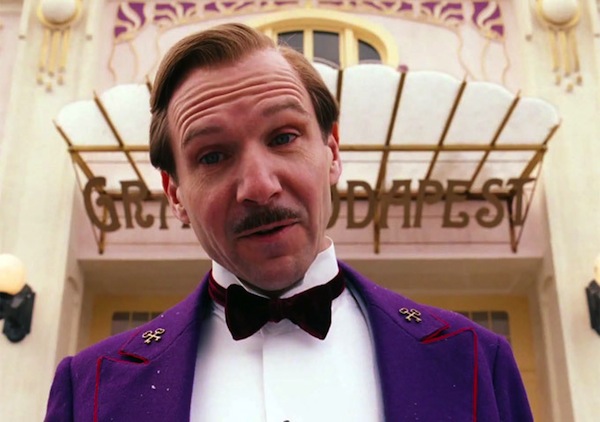You have no items in your cart. Want to get some nice things?
Go shoppingA film from a director that needs little introduction, Wes Anderson returns with “his eighth and best film yet”.
Rich red carpets, purple-liveried staff, ornate gold-gilded staircases and a vast, sumptuous lobby that oozes nostalgic decadence – The Grand Budapest Hotel is a visual feast akin to gazing through the glass of a Viennese patisserie at an extravagant and elaborate confection that is as ingenious as it is intricate. Every detail is considered, every whim explored, and a fantastical world takes flight, fully formed, and bearing all the distinctive hallmarks of a Wes Anderson film.
This is his eighth film and best yet. A departure from American shores, yet retaining all the eccentricities of The Royal Tenenbaums and warmth of Moonrise Kingdom, The Grand Budapest Hotel is Anderson’s first foray into Europe, and his first film to directly reference and credit an author, Stefan Zweig, a Jewish writer who fled Nazism and committed suicide in 1942, and whose stories revealed their characters’ inner workings within multi-layered structures.
And it is a literary structure that frames this narrative. In the present day, a girl clutches a copy of a book entitled “The Grand Budapest Hotel” as she visits a statue of its author. But this is just the outer layer of our story, our first Russian doll, which Anderson opens to reveal another story; this time, we are in 1985, and the same author begins to describe the time he spent at the hotel years ago. Another Russian doll is produced; we return to 1968, and see the writer, younger, staying in the dilapidated hotel, where he meets the hotel’s owner, Mr Zero Moustafa. Over supper in the cavernous dining room, Mr Moustafa tells the writer the story – the final, solid, Russian doll – of how he came to the hotel in its heyday as a lobby boy in 1932 and was taken under the wing of fastidious and charming concierge Monsieur Gustave, played by Ralph Fiennes.
Gustave steals the show. In equal parts pernickety, suave, foppish and elegant, he exudes old-world opulence and poise but surprises with random outbursts of profanity, jumpiness and a sexual proclivity that extends to satisfying eighty-five-year-old Madame D, one of the hotel’s many rich old ladies. Really, though, it’s Ralph Fiennes who steals the show, not least because he plays this highly idiosyncratic character with brilliant deadpan but eccentric humour that is in itself completely unexpected – he liberally peppers his speech with a dandified daaarling – but also because he brings an emotional kindness to the film that steers it firmly away from the brittle tension of some of Anderson’s previous offerings.
This sweetness is encapsulated in the friendship between Gustave and young orphan Zero, which blossoms when, dashing across the country to attend Madame D’s wake, the duo’s train is stopped by menacing soldiers who threaten Zero. Gustave leaps to his defence and the two become firm, if unlikely, friends. And when Gustave is bequeathed a priceless painting in Madame D’s will, only to be accused of her murder by her scheming family, apprentice Zero returns the favour by sticking by his master. Hilariously preposterous scenes ensue: a jailbreak, a mountain chase on skis and a very nasty incident involving the loss of fingers.
The success of such an outlandish story is in its telling. Anderson is a master of bathos, and there is absurdity in many of his scenes – jerky little movements within a wide, still frame; a camera shot lingering for a second too long; an unexpected zooming in on a ludicrous setup. Most noticeable of all is the impression of a doll’s house he cultivates, wherein characters are either too big for their surroundings, or dwarfed by madcap proportions of grandeur. The effect is one of watching a miniature theatre or an intricate wind-up toy – and it is a curious feeling. Enthralled by its workings and minutiae, you nevertheless remain aware that, should the camera move an inch or two to the left, the illusion would shatter. Anderson’s poise and control ensure that the illusion is unbroken, but the suggestion is there – intentionally, it would seem.
The suggestion of a wider world outside this wonderful box of delights is one of the more intriguing aspects of The Grand Budapest Hotel. Anderson has been accused of making the same, self-indulgent, film again and again, but here he broadens his lens to take in the fear and darkness of 1930s Europe, when a continent peered into the abyss of fascism. While Anderson broadens his outlook, though, his plot loses some of its dramatic pull and, in places, feels a little baggy. Despite its authorial tone and structure, this is not a film of narrative strength; instead, the emotional resonance and visual brilliance sustain us.
The Grand Budapest Hotel is in cinemas from March 7th and as a Secret Cinema Experience, read our review of the immersive theatre and film performance.

About Bella Bosworth
Bella Whittington reads and reviews a bit of everything, but is particularly interested in literary fiction, translations and short stories. After living in Spain for a year, she now works as an assistant editor for Transworld Publishers in London. She has also contributed to Thresholds, the University of Chichester's international short story forum, and the Harker.





